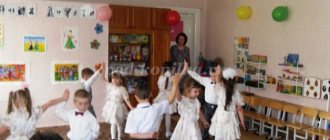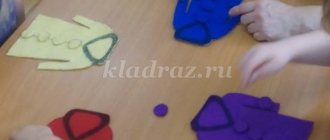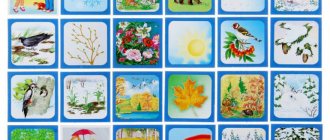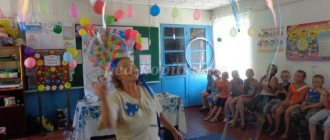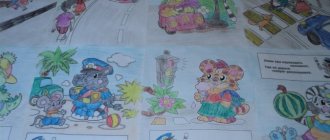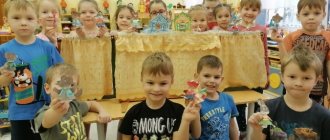Scenario of the costumed crafts fair “In the village of Filimonovo”
The folklore holiday was prepared by employees of kindergarten with an ethnocultural Russian component of education No. 2096 ZelAO of Moscow:
- additional education teacher Susanna Israelovna Saribekyan,
- musical director Bobrovich Margarita Aleksandrovna.
Target
Introduce children to the folk toy Filimonovskaya, the method of making it and painting it with yellow-red-green stripes. Learn to look at clay toys, highlight the material - clay, toy decorations, elegance, brightness. Create a joyful mood from a meeting with a folk toy, enhancing the impression by using folklore works and costumes.
Hall decoration
Autumn picture of the village: a hut, a well (the roofs are painted with Filimonov patterns), trees decorated with leaves to match the Filimonov painting; Grandfather Philemon is sitting on a bench under a tree. Tables with patterns and figures are hung. Prepared
- a table on which Filimonov’s toys are placed: a rooster, a cow, a soldier, a madam, a poultry woman, a horseman; rotating carousel with figures;
- goods for the fair: bagels, beads, handkerchiefs.
"Folk holidays in the life of preschool children"
Municipal Budgetary Preschool Educational Institution "Kindergarten No. 3" of the city of Cheboksary "Little Country" Project on the topic "Folk folk holidays in the life of preschoolers" Prepared by: music director of the first qualification category Alekseeva Lyudmila Leonidovna Cheboksary, 2016 Introduction
“Childhood is the most important period of human life, not preparation for a future life, but a real, bright, original, unique life. And how childhood passed, who led the child by the hand during childhood, what entered his mind and heart from the world around him - this decisively determines what kind of person today’s child will become” (V.A. Sukhomlinsky).
Currently, Russia is going through one of the difficult historical periods. And the greatest danger facing our society today is not the collapse of the economy, not the change of the political system, but the destruction of the individual. Nowadays, material values dominate over spiritual ones, so children have distorted ideas about kindness, mercy, generosity, justice, citizenship and patriotism. The formation of the foundations of moral qualities begins in preschool childhood. The spiritual and moral development of the child largely depends on how successfully this process is carried out.
Preschool age is the foundation of a child’s overall development, the starting period of all high human principles. Preserving humanity in our children, laying moral foundations that will make them more resistant to unwanted influences, teaching them the rules of communication, the ability to live among people are the main ideas for educating the spiritual and moral qualities of the individual. Kindergarten is a cultural and social placenta for every preschooler, where his social experience is formed and practiced. In this space, children learn to perceive complex life phenomena, their manifestations of social and material stratification are smoothed out, and a humanistic orientation is formed. In the cultural and educational space of a preschool educational institution, a preschooler masters a system of values, norms, and stereotypes of society; he develops a system of internal regulators and habitual forms of behavior. In it, he not only adapts to life, to the social environment, but is the creator of his life, transforms himself and self-realizes.
Standardization in the education system is normalized by order of the Ministry of Education and Science of the Russian Federation dated October 17, 2013 No. 1155 “On approval of the Federal State Educational Standard for Preschool Education.” There has never been such a standard in Russia. And every year he opens the doors to the Russian educational system wider and wider. And on January 1, 2014, the order of the Ministry of Education and Science of the Russian Federation “On approval of the Federal State Educational Standard for preschool education” came into force.
Federal State Educational Standard is a federal state educational standard.
Federal State Educational Standards for Additional Education is a set of mandatory requirements for the structure of the Program and its volume, conditions for implementation and results of development of the Program. The Program itself is developed on the basis of the standard. This is done by preschool institutions themselves. Its content should ensure the development of the personality, motivation and abilities of children in various types of activities, guarantee the protection and strengthening of the physical and psychological health of pupils, comfortable in relation to pupils (including those with disabilities). The integrative result of the implementation of these requirements is the creation of a developing educational environment: Ensuring the spiritual and moral development and education of children, as well as high quality preschool education, its accessibility, openness and attractiveness for children and their parents and the whole society. The cultural and educational environment of a preschooler is the foundation for the Program of spiritual and moral development, education of students at the levels of primary general education (clause 19.6. Federal State Educational Standard), which is based on key educational tasks and the basic national values of Russian society. In connection with these, the task was set to orient the project “Folk folklore holidays in the life of preschool children” towards solving the main problem of modern society - the loss of moral interests and universal values.
Folk culture is one of the means of moral, cognitive and aesthetic development of children. A modern preschooler lives in a time when Russian culture and native language are influenced by foreign cultures. On TV screens, children see Disney cartoons; characters from foreign films become the heroes of modern children. But what about our fairy-tale heroes, wonderful cartoons of the Soviet period, amazing fairy tale films where good triumphs over evil? Let us recall the words of academician D.S. Likhachev: “The Russian people should not lose their moral authority among other peoples - an authority worthily won by Russian art and literature. We must not forget about our cultural past, about our monuments, literature, language, painting. Rational differences will remain in the twenty-first century if we are concerned with the education of souls, and not just with the transfer of knowledge.” It is the native culture that must find its way to the heart and soul of the child and lie at the basis of his personality. And one of the means of spiritual and moral education of preschool children is oral folk art. It is no coincidence that folklore has been properly evaluated in various aspects since ancient times: as a means of pedagogical influence, as a means of psychological and pedagogical study of a child, as a means of forming spiritual and moral culture, as a means of enriching the vocabulary of children and as a means of conveying the beauty and imagery of the Russian language. Only works of oral folk art miraculously combine deep wisdom, ease of understanding and ease of memorization, corresponding to the psychophysiological characteristics of preschool children.
Relevance
Interest and attention to folk art, including music, has recently increased even more in our country. They are increasingly talking about the need to introduce children to the origins of Russian culture, about the revival of folk holidays with their traditions. The importance of various forms of Russian folklore in the musical education of preschool children is difficult to overestimate. After all, by introducing children to folk art, we thereby introduce them to the history of the Russian people, to moral universal values, which are so lacking in our turbulent times. It is impossible not to note the role of folk culture in the spiritual and moral education of preschool children. Our ancestors left us a truly inexhaustible source of folk wisdom. With a little creativity, invention, improvisation, old ritual folk festivals will turn into wonderful holidays for our children. That is why the development of the project “Folk Folklore Holidays in the Life of Preschool Children” has become relevant. In order to raise a harmoniously developed personality, it is necessary to cultivate cognitive abilities in a child from an early age, since the task of preschool pedagogy, especially in modern conditions, is to develop the child’s cognitive abilities, since any country needs diversified people. Intellectually savvy, harmoniously coordinated individuals, and preschool pedagogy contributes to the education of such children.
The object of research of this project involves the process of introducing children of senior preschool age in our preschool institution.
The subject of this project activity is the way of introducing children to folk culture.
Project goal: Introducing preschoolers to the origins of Russian folk culture by introducing them to folk holidays.
Project objectives:
— To form in children a sustainable interest in folk art, a desire to get acquainted with various genres of folklore. — To intensify children’s ideas about national holidays, customs and traditions of the Russian people. — Develop emotional perception of folk music in various types of musical activities. — To acquaint children with Russian folk songs of various genres, with the sound and appearance of Russian folk instruments. — Develop imagination, creative and acting abilities. — Expand the range of the child’s voice, develop vocal and choral skills, purity of intonation using folklore. — To foster patriotic feelings and pride in a great power. — Involve parents in joint activities to implement a project to introduce children to the origins of Russian national culture.
The novelty and distinctive feature of the project is the introduction of children to creative activities. Creation of game miniatures, staging of folk festivals, as well as knowledge of the origins of folk art.
a need to create this project, since it is considered as a multifaceted process associated with the development of children’s musical perception, imagination, ear for music, forms a performing culture, and motivates creativity.
Expected results: -
sustainable interest in the culture of the Russian people; - children’s knowledge of oral folk art, songs, dances, games, decorative and applied arts.
Project abstract
The project “Folk folklore holidays in the life of preschool children” represents an internal regulatory document and is important for assessing the quality of the music educational process in kindergarten. The main idea of the project is humanization, the priority of educating universal human values: goodness, beauty, truth in preschool childhood. The project is based on the integration of artistic speech, music, gaming, movement and dance, visual, and theatrical activities. It is based on introducing children to folk art (listening to folk music, fairy tales, nursery rhymes, proverbs, sayings, riddles, lullabies).
Project implementation stages
I. Organizational and preparatory - Justification of the relevance of the topic, motivation for its choice; — Defining the goals and objectives of the project; — Selection of literature, manuals, attributes; — Discussion with the children’s parents on issues related to the implementation of the project.
II. The main one is Direct educational activities with children. — Joint activities — Independent activities of children.
III. Final
— Generalization of the results of the work; — Activity analysis.
The main principle of the project is the principle of interaction of a child with various forms of folklore. Ritual songs, games, dances, folk tales, small folklore genres are all invaluable wealth that can help a child overcome constraint, shyness, and become a creative person.
Formulation of the problem.
Currently, many modern children grow up on primitive musical “masterpieces”, the sole purpose of which is mindless submission to the rhythm and deafening cacophony of sounds. This creates an environment of spiritual poverty and artistic dullness and does not contribute to harmonious and moral development. Observing children during folk festivals, theatrical folk performances, folk performances, when getting acquainted with various forms of oral folk art and small musical folk forms, one can see their keen interest in this process and cognitive activity. Children develop a reciprocal emotional feeling, an interest in the customs and culture of the people of which they are carriers, and moral values are harmoniously formed: the idea of goodness, beauty, truth and fidelity, which acquire special significance these days. Listening to children’s speech, one can note its scarcity, weak attempts to construct logical phrases, stories, express thoughts, and retell text.
Russian proverbs, fables, sayings, tongue twisters (the oldest speech therapy), jokes, songs, amusing and boring fairy tales not only reveal the sound beauty of the native word, coordinate movement and speech, but also expand, enrich, and activate the child’s vocabulary.
Based on the methodological manual for teachers “The Folk Calendar and Children” by S. Chernoskutova, the folklore material of the book, the methodological recommendations and program of E.G. Churilova, the author’s technology of A.I. Burenina, I count on the positive dynamics of solving the problem during the implementation of the project .
Event plan
| Stage | Event | Deadlines | Responsible |
| Organizational and preparatory | Parent surveys, observations | September | Musical director, teachers |
| Basic | Consultation for educators “The role of musical folklore in the lives of preschool children” | October | Musical director |
| Seminar-workshop for teachers “Folk art in kindergarten” | November | Musical director | |
| Consultation for parents “The role of musical folklore in the lives of preschool children” | December | Musical director | |
| “Master class” for parents “Making Russian folk dolls” with a presentation | January | Musical director | |
| Consultation for parents “Introduce kids to folklore” | March | Musical director | |
| Round table with the participation of parents “The role of folklore in raising children” | April | Musical director, teachers | |
| Final | Parent surveys, observations | May | Musical director, teachers |
Activities plan with children
| event title | Form of conduct | Preliminary work | Material | Direction |
| Autumn in Rus' | Holiday | Conversation about autumn holidays, folk signs and customs associated with them, learning Russian folk songs, riddles, games and dances with children. | Illustrations, costumes, noise children's musical instruments | Artistic and aesthetic development |
| Christmas gatherings | Holiday | Conversation about Christmas holidays, the customs of dressing up for Christmas time, learning Christmas carols, Russian folk games | Costumes, children's noise musical instruments | Artistic-aesthetic and cognitive-speech development |
| Oh yes Maslenitsa! | Russian festivities | Conversation about the celebration of Maslenitsa, learning songs, dances and folk games. | Mummers' costumes, noise musical instruments | Artistic, aesthetic and physical development |
Resource support for the project
1. Regulatory and legal resource:
- coordination of the project with the administration of the kindergarten;
- approval of the project at a meeting of the creative group of teachers.
2. Material and technical resource
- purchasing equipment, musical instruments, consumables for making manuals, sewing costumes.
3. Information resource:
- selection of methodological and educational literature on the topic;
- collecting information on the project topic from Internet resources and periodicals.
Project resource support:
Informational:
- The program “From birth to school” edited by N. E. Veraksa, T. S. Komarova, M. A. Vasilyeva.
- Program “Introducing children to the origins of Russian folk culture” (O.L. Knyazeva, M.D. Makhaneva, 2001).
- System of work to create a culture of a healthy lifestyle “Our tradition is to be healthy!” (Karepova T.G., Zhukovin I.Yu.).
- Folklore art therapy (L.D. Nazarova, St. Petersburg, 2002).
Financial:
The project is being implemented at the expense of budgetary allocations from MBDOU "Kindergarten No. 3" in Cheboksary (purchase of methodological literature, equipment, etc.), as well as through the volunteer activities of preschool teachers and parents of preschool students (production of attributes, visual and didactic aids, etc. .).
Logistics:
The implementation of the project requires the production of information materials for parents of students.
Personnel:
The development and implementation of the project is ensured by full-time employees of the preschool educational institution:
- music director of the first qualification category Alekseeva L.L.;
- senior teacher Gorbunova M.N.
As a result of the project:
- children will show an active interest and desire to engage in poetic and musical folklore;
- Children will develop acting skills and communication abilities;
- educators will receive an interesting technology for working with children, based on the creation of imaginative play situations that require children to transform, work with imagination, and imagine. They will make entry into the world of folklore for a child desirable, interesting, entertaining, personally colored and meaningful. Teachers will also gain experience in making costumes, props, props and experience in joint collaboration with children and parents.
Risks and ways to overcome risks
Of course, when testing a project, you need to take into account that certain difficulties and risks will arise.
I would like to note the problems that we may encounter:
- the content of some classes may not be fully structured taking into account the age characteristics of preschool children;
- the content of one lesson may include two or more works, which is difficult for children to perceive;
- the music director will have to prepare thoroughly for each lesson, rework it and make changes;
- There is not enough methodological base; in preparation for the lesson, it will be necessary to find and review a large amount of literature, prepare a large amount of visual material, illustrations, paintings.
But all these problems can be overcome with the help of interaction between the teaching staff and parents. Currently, the problem of spiritual and moral education of children is especially acute. The present and future of Russian society and the state are determined by the spiritual and moral health of the people, the careful preservation and development of their cultural heritage, historical and cultural traditions, norms of public life, and the preservation of the national heritage of all the peoples of Russia.
Particularly significant is the period of preschool childhood, the period of the child’s initial entry into this huge, amazing and beautiful world. It is in preschool age that the foundation of a system of spiritual and moral values is laid, which determines a person’s attitude to the world in all the diversity of its manifestations. The child develops the foundations of his attitude towards himself and others, and society as a whole.
Interaction with specialists and parents:
The implementation of the project will be more effective and efficient with the participation of preschool educational institutions specialists: it will be necessary to resort to consultation with an educational psychologist to solve social and moral problems in children. Advice from a speech therapist will help improve the speech skills of preschoolers. Other teachers will take part in holidays and entertainment in the role of characters. It is planned to hold conversations with parents; their participation will help to consolidate at home the knowledge and skills acquired by children in classes and, thereby, achieve the results we want.
The strategy for working with parents of pupils involves
- informing parents about the goals, objectives and results of project activities;
- conducting problem-oriented analysis to compare the achieved results with the predicted ones.
The model of cooperation between teachers and families of pupils is built as a process of interpersonal communication, the result of which is the formation in parents of a conscious attitude towards their own views and attitudes in matters of spiritual and moral education of the child.
The teaching staff in this direction will solve the following tasks:
- unite the efforts of teachers and parents;
- create an atmosphere of community of interests in the process of organizing project activities.
In order to familiarize parents with project activities, active forms of work will be used. Close interaction with the families of pupils and pedagogical education of parents will be carried out in the classes: “Schools for Parents”. For parents, consultations will be posted on stands: “Folk holiday in the life of a child”, “Orthodox holidays”.
Thus: constant work with the family will allow us to observe the principle of continuity and continuity of spiritual and moral education in the family and kindergarten. The work of the kindergarten in this direction meets the needs of parents who want to see their children spiritually, mentally and physically healthy.
Necessary conditions for program implementation:
Special premises, technical means, Russian folk musical and noise instruments, folk household items, folk costumes, different types of theater, oral and musical folklore material, paraphernalia.
Conclusion:
The project “Folk folk holidays in the life of preschool children” should become a powerful impetus for the development of the entire teaching staff in matters of introducing preschool children to Russian traditional culture. The main task is to help the child develop and show his creative potential. To do this, I will make an attempt to generalize and systematize the folklore repertoire from various sources with an emphasis on the social, moral and musical development of preschool children, as well as overcoming shyness in children through musical, theatrical, and play activities. In general, the project in its development should have progress, since its originality lies in the interaction of creativity, mastering the experience of past generations, studying it, and implementing the acquired knowledge in everyday life. Folklore and folk art teach children to understand good and evil, as well as to resist negative phenomena. This project will help to take a comprehensive approach to the problem of social and moral education of preschool children and solve communication and speech problems. We will assign the leading place in the process of children acquiring their first ethnocultural knowledge to the children's folklore festival. We will try to create a joyful mood in the child, emotional uplift and form a festive culture (knowledge of the traditions of the national holiday, the peculiarities of organizing the festive event, the rules of inviting guests and guest etiquette). Preparing for a holiday always arouses interest in children, on the basis of which artistic taste and unity between children and adults are formed. The most important thing is that no one should be a passive observer. We, adults, must give vent to children's aspirations, help satisfy their desire to participate in games, dances, dramatizations, and in decorating the hall and group. This contributes to the socialization of the child, forms an active position in him and causes a desire to preserve the traditions and customs of the Russian people.
List of used literature
- Boronina, E. G. “Amulet”. A program for the comprehensive study of musical folklore in kindergarten. – M.: Vlados, 1999.
- Vetlugina N. A. Musical education in kindergarten. – M.: Education, 1981. – 240 p., notes. - (B-kindergarten teacher).
- Dzerzhinskaya, I. L., Musical education of younger preschoolers: A manual for educators and musicians. Head of Det. garden (from work experience) - M.: Education, 1985 - 160 p., notes.
- Tuning fork: program for music education of early and preschool children / E. P. Kostina. – M.: Education, 2004. – 223 pp. - ISBN 5-09-014666-7.
- Tuning fork: program for music education of early and preschool children / E. P. Kostina. – 2nd ed. - M.: Education, 2006. - 223 pp. - ISBN 5-09-014666-7.
- Kaplunova, I., Novoskoltseva, I. A holiday every day. Music education program for preschool children “Ladushki”, preparatory group. St. Petersburg: Publishing house "Composer", 1999, - 60 p.
- Knyazeva O. L., Makhaneva, M. D., Introducing children to the origins of Russian folk culture.
- Doronova T.N. Together with family. M. Education, 2006.
- Radynova O.P. Musical education in the family. M. Education, 1994.
- Kalinina T.V. New information technologies in preschool childhood J. Preschool Education Management 2008 No. 6.
- Veraksa N.E., Veraksa A.N. Project activities for preschoolers. A manual for teachers of preschool institutions. – M.: Mosaic-synthesis, 2008. – 112 p.
- Kiseleva L.S. and others. Project method in the activities of a preschool institution: - M.: ARKTI, 2003. - 96 p. 4.
